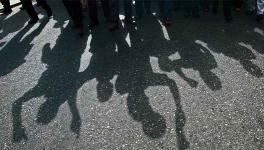‘Time we Return to Real Substance and Spirit of our Constitution’
Over the years, Republic Day has been observed in a lack-lustre fashion, with little public enthusiasm. In fact, the idea of the republic itself finds little popular response as the idea behind the function has been appropriated by the government, perhaps in a bid to arrogate to itself its meaning and aura.
However, “we the people” had better reclaim the sovereignty we have so far listlessly delegated to elected governments. That is, we must ensure that the republic does not lose its fundamental character. The situation today is so fraught with public anxiety and alarm about the country’s future with a reckless dictatorial government playing with laws and tampering with our rights as citizens that it is time to affirm our commitment to the immutable basis of the republic.
To retrace history briefly, we did not become a sovereign republic when the British left India in 1947. At that time, the people of India had not assumed full control of the state and determined its character, guiding principles and form of government as well as their fundamental rights and expectations from the state.
It is only after the Constituent Assembly formed by representatives of various provincial legislatures, and of various strata of society, prepared and adopted the Constitution after four years of thorough-going discussion and debate at the end of 1949 that on 26 January 1950 India became a full-fledged republic. We became a sovereign independent republic. It was at that moment that we finally shook off 200 years of abject servitude after one hundred years of struggle and solidarity, at the cost of innumerable lives lost, ruined and extinguished by British colonial tyranny under a veneer of Pax Britannica.
Today we are at a juncture when all that sacrifice, blood and sweat of countless millions for generations, is in danger of being nullified by heedless and thoughtless power driven by an ideology at odds with their dreams. It is time we get together and once again to take a solemn vow to fight to the last drop of our blood the essence of our Constitution, of our freedom.
The overriding aim of the colonial rule had been for two centuries to plunder our natural resources, exploit our farmers and craftsmen with a pittance for the value of their labour and skill, and shamelessly impose back-breaking taxes on impoverished masses. It was in protest against 30% tax on a basic ingredient for preservation of human life—salt—that Gandhiji launched the Salt Satyagraha which electrified the nation and the world.
It was with a view to suppressing the spontaneous anger and rebellion against monstrous exploitation and injustice that the British colonial rulers imposed laws that were a caricature of legality. Acts were framed not by representatives of Indian people but by the British Parliament and British bureaucracy with the token support of puppet legislature and the overriding power of the Viceroy.
Section 144 was proclaimed at any place and time of their choice by these rulers, all ventilation of public grievance and criticism of colonial government were outlawed. The press was gagged often and freedom of speech became a ghost of its real substance. In fact any forceful demand for freedom, not to speak of militant outburst, was termed sedition and put down with unparalleled ferocity.
An example of such state violence in the name of law was the infamous Rowlatt Act of March 1919, enforced a hundred years ago. It enabled the police to arrest on merest suspicion any Indian and detain him for two years without trial. There was outrage against this criminal act all over India and Gandhiji denounced it vehemently. In April 1919 a protest meeting to be addressed by respected leader Saifuddin Kitchlew was convened at Jalliwanwala Bagh in Punjab. Apart from people coming to that meeting, that being the holy Vaisakhi day for Sikhs, there were countless people unaware of it.
Meanwhile, Martial Law administrator Brigadier General Dyer hastily declared a curfew in the town which was not given required publicity, positioned himself with soldiers armed with machine guns near the entrance and exit points and opened fire on unarmed and peaceful crowds. The panic and the stampede were unimaginable;1,500 people were wounded and out of them 600 lost their lives on the spot or in hospitals.
An uproar shook India. Tagore returned his knighthood to the crown in anguish. But whatever Dyer's intentions, the freedom struggle did not die down, but increased in intensity and extent, became even more resolute.
It is most unfortunate that today we have been confronted in India by an elected government that rivals the colonial power in relentless cruel autocracy. Our freedom of thought and expression are being taken away. Our protests out of honest anger and disappointment at the government's unlawful and unwise acts bearing down on helpless people are being ruthlessly suppressed. False charges galore are being clamped on people to send them to jail. We are being tortured by the heinous UAPA act reminiscent of colonial tyranny. The media are under unimaginable constraints.
It has therefore become an imperative necessity for us to return to the real substance and spirit of our Constitution and take a solemn vow today to protect its dignity and honour from distortion and subversion with all the power at our command as citizens of a democratic republic.
(Translation of speech at Constitution Protection Day in Guwahati on 26th January.)
Get the latest reports & analysis with people's perspective on Protests, movements & deep analytical videos, discussions of the current affairs in your Telegram app. Subscribe to NewsClick's Telegram channel & get Real-Time updates on stories, as they get published on our website.
























